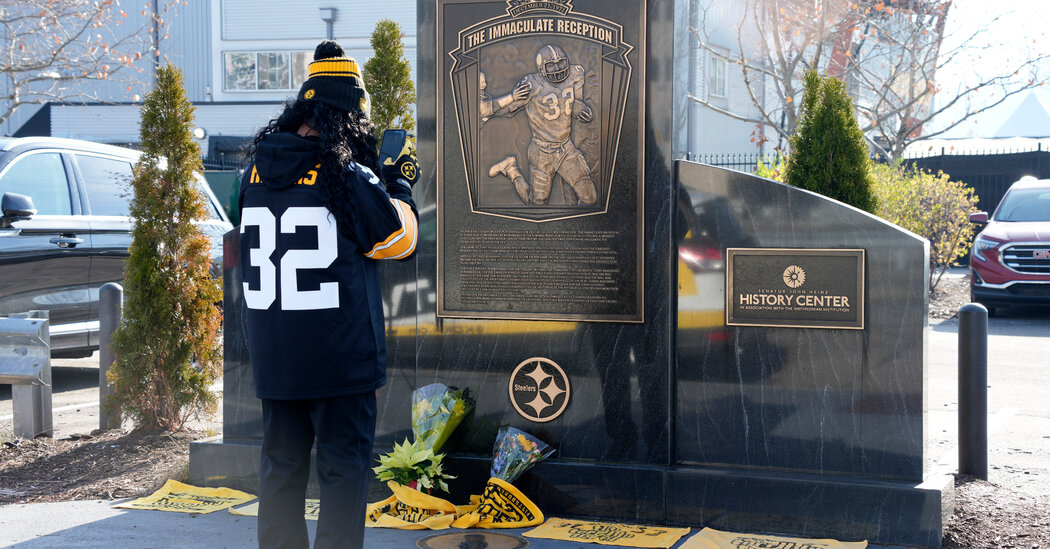
The enduring memory for me is the noise. That, and the often forgotten confusion over an obscure N.F.L. rule that almost annulled the “Immaculate Reception.”
The announcement of Franco Harris’s death on Wednesday, just two days before the 50th anniversary of the unforgettable play, calls up a swirl of memories for me, some because I was in the stands at the game, some from having been in the Pittsburgh universe then.
Back then, the Steelers’ historic ineptitude was a notable backdrop to that 1972 playoff game. The team had previously made it to the postseason only once in its 40-year history — and that had been in 1947. The Steelers were the Houston Texans of their day.
Luckily for me, my father had seen promise in this version of the team and bought season tickets, meaning we would be among the fortunate 50,000 people in Pittsburgh who could watch the game as it happened.
In those days before the N.F.L. fully boomed in popularity, the league believed live broadcasts in the home team’s city would deter ticket sales — and the rule weirdly applied even to a sold-out playoff game.
The game was a brutal defensive battle in the December cold, with a scoreless first half. The Steelers built a 6-0 lead on two field goals, but then what had seemed inevitable finally happened: The favored Raiders scored a touchdown with just over a minute left.
Remembering Franco Harris
The Hall of Fame running back for the Pittsburgh Steelers who caught the “Immaculate Reception” died on Dec. 21. He was 72.
- 2012 Interview: We asked Franco Harris if he still gets goose bumps when he thinks about the “Immaculate Reception.” This is what he told us.
- A Legendary Moment: Here’s what we wrote about the catch in 1972, which remains one of the most memorable moments in N.F.L. history.
- His Enduring Qualities: “He’s a Rolls-Royce,” Terry Bradshaw said of Harris in 1983. “And since I haven’t seen too many of them driving around the streets of Pittsburgh, it’s nice to know there’s one sitting right behind me on the field.”
Things looked grim. Friends who came with us left to beat the crowd. (Regrets? They have a few.)
Thankfully, my father is a big believer in staying to the end. You never know what will happen, he says — a lesson he learned after once missing an unlikely finish to a basketball game.
So there we were, standing at our seats in the end zone behind the play and, like all the other Steelers fans, holding only the faintest hope as that desperate fourth-down play unfolded.
Our hopes collapsed when Terry Bradshaw’s long pass bounced away from John “Frenchy” Fuqua and into the air. In my memory, there was a shared groan throughout the stadium.
And then!
Bedlam. Harris was running, the crowd was roaring, the referees were huddling. Had the ball touched a Raider after it bounced off Fuqua, or had it bounced from one Steeler to the next? The rules at the time didn’t allow a player to deflect a pass to his own teammate, even inadvertently.
It would have taken a bold official to rule the play illegal with a jubilant crowd spilling into the end zone around him, and of course the play stood.
Hours later, the broadcaster Myron Cope, himself a beloved Pittsburgh character, took a call from a listener whose friend had christened the play “The Immaculate Reception.” The legend had its necessary luster.
In a blink, Harris had become the prince of Pittsburgh. His fans, playing off his mother’s heritage, labeled themselves “Franco’s Italian Army” and even Frank Sinatra joined their ranks.
The Steelers lost to the Dolphins in the next round, but won four Super Bowls in the next eight years. Harris went on to become the second-leading rusher in league history, earn induction into the Hall of Fame and see his statue placed next to George Washington’s in Pittsburgh International Airport.
He remained humble, even as a 22-year-old in the delirious moment of his most famous touchdown. That grace and good will made him all the more beloved. His army of fans remains, if in unexpected mourning as we prepare to honor the anniversary of the catch that still conjures the thought of divine intervention.